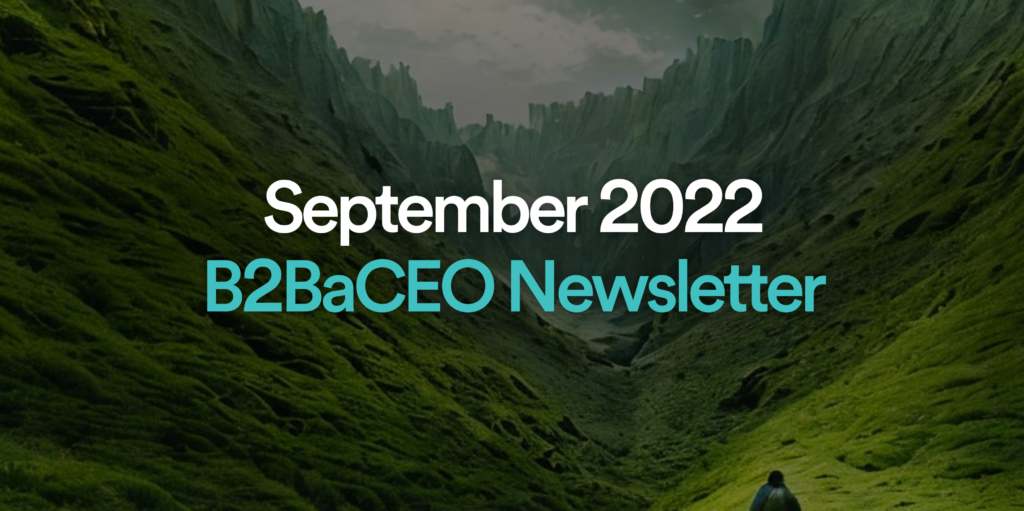FC Fintech Newsletter May 2023
05.01.2023 | By: Foundation Capital

What the heck is this in my inbox, you might be asking, yet another piece of content marketing? Why yes! This is the first installment of Foundation Capital’s new quarterly fintech newsletter. Our aim is for this mass mailer to be roughly 19% more nutritious and to the point than the usual flotsam.
Every few months, we’ll be sharing news from our fintech team and portfolio companies, as well as our thoughts on something cool or compelling that we can’t get off our minds.
As a team of investment professionals, our core focus is searching out and supporting early-stage startups that help drive fundamental product innovation in financial services markets across the globe. We believe that fintech is the most exciting sector in tech right now (short of anything that involves an API call to GPT-3).
If fintech is also what gets you up in the morning, then this is the newsletter for you. And, of course, if you or anyone you know is even thinking about starting a company in this sector, reach out to one of the investors on the Foundation Capital fintech team.
Collaboration as Competitive Strategy
It’s a time-honored ethos in tech: “Move fast and break things,” said Facebook. Uber took that further and openly flouted regulation to reach more customers. Over the last decade, as fintech has grown from back alley to major thoroughfare of tech, it’s largely adopted this ethos as well.
I know we don’t have permission to access your system, we’re creating security issues for your users, and you’re actively telling us to stop — but we’re not going to stop!
Sound familiar?
What about this?
We’re advancing money to customers for a fee, but we’re not a loan and so not subject to any sort of lending law, so we can charge anything we want!
This is broader than just regulatory arbitrage, let’s call it the Pirate Strategy. There are certainly instances where it’s succeeded in fintech and there will likely be more. But too much of the conversation about driving innovation in financial services is about pirates and that’s a problem.
First of all, it promotes a dangerously flippant attitude toward the existing system — both regulators and incumbents. This point isn’t novel but still necessary to say: if your business relies on skirting almost any amount of existing financial services regulation, you don’t have product-market fit. Regulatory scrutiny is designed to increase with scale. There may be a level of scale below which it might seem like regulators don’t care at all, but assuming you have the good fortune of hitting your growth targets, regulatory censure will remain an existential risk.
The pirate orientation also prevents us from sufficiently respecting incumbent providers. It matters a lot less than you think how many lines of COBOL their systems are powered by, incumbent financial services providers are largely not “about to be disrupted.” Nor do they fail to understand the opportunities that tech increasingly offers.
It’s not just that they have three or four orders of magnitude more volume than that flashy growth-stage company in industries that are highly sensitive to economies of scale. They have durable margin at that scale and asymmetric information about where that margin moves across economic cycles. Also, they definitionally have just about all of today’s customers, and switching costs for these often multiproduct relationships is brutal. Finally they have more ability to influence regulators than anyone else; they’re best friends really. All together, a lot of reasons for startups to be trepidatious about competing directly.
More problematic is that pirate thinking distracts us from what I see as the most obvious opportunity in fintech. There are myriad ways in which a nimble software team can align incentives with the existing system to leverage its scale and create net new value for everyone.
- Partner to create a product that’s never existed
- Sell it to customers they can’t reach
- Pay them fairly for the access
More flies with honey and such! This is the natural endgame for Open Finance. Integrations that work because they are officially sanctioned and business models that are durable because incentives are aligned. Collaboration as a competitive strategy.
I know this is all very non-specific. How about an example?
Let’s talk about payroll payments. Almost every veteran of non-prime lending I know has at least daydreamed about having a way to collect directly from a borrower’s paycheck, rather than from their downstream bank account. This pushes the loan to the top of the borrower’s repayment hierarchy, vastly reducing delinquency and charge-off risk. The potential for savings is in the tens of billions of dollars per year across US consumer lending, not to mention the opportunity for credit expansion given the magnitude of the credit enhancement it affects.
Why doesn’t this exist already? It’s an issue of incentives and fragmentation. It takes a long time — too long usually — to explain to an HR department why it would be in the best interests of their employees. And from a headcount perspective, US employment is horrifically fragmented. These two issues together have made the cost of establishing a critical mass network of employees infeasible — until now.
Last month at Fintech Meetup, Highline unveiled the first at-scale payroll payment network. With only the information provided in a loan application and customer consent, Highline can access their payroll account and set up a new direct deposit. No username and password, no screen scraping, no anxiety about tenuous ongoing access. A hundred percent conversion for eligible borrowers. It unlocks an incredible opportunity for lenders and, frankly, most billers as well. Cool stuff!
The key ingredient for Highline is partnership with the payroll universe. These are their systems that need to be accessed and these are their customers in need of a better way to service their debts and pay their bills. Rather than stealing this access, Highline sees payroll providers as their business partners, activating an entirely new line of business for them. Put another way, they see collaboration as a competitive strategy!
***If you have reactions to or feedback for me about this idea or the overall newsletter, I’d love to hear from you! Drop me a line at znoorani@foundationcap.com.
In Local News
New additions. We’re thrilled to welcome Gracie Zaro and Alejandra Martinez to the fintech team! They’ll be based in our growing NYC office, anchored by partners Angus Davis and Nico Stainfeld.
Tech >> Fin. Charles Moldow, who leads our fintech practice, published “A Local’s Guide to Fintech Investing,” which lays out how our approach to fintech investing — that of the fintech locals — differs from the tourist investors who are out there inexpertly deploying capital and irrationally inflating valuations. It boils down to these six key lessons.
Treasury management for startups. Silicon Valley Bank’s collapse left many founders scrambling to make payroll and asking questions about treasury management that never occurred to them prior. Partner Angus Davis, himself a former entrepreneur, put together a best-practices guide for his founders. He decided to share the advice with any startups who want to understand how to better manage their cash.
The Zach Noorani Audio Experience. Zach joins the Fintech Leaders podcast to discuss the future of financial services, global fintech opportunities, and lessons from investing mistakes.
$50,000 Cal startup competition. Foundation is partnering once again with The ORCA Network, a leading university-based startup platform that has a presence in over 20 of the top campuses around the country. After a very successful event at Stanford University last fall, FC partners Charles, Joanne, and Nico will be judging an exciting crop of UC Berkeley startups on April 11th. The winner walks away with $50,000 for their startup.
Super-Secret Fintech Dinners. If you’re a founder or executive who is interested in joining us for dinner and discussion about all things fintech, sign up here to be invited to one of our irregularly held, but deeply felt, new series of private dinners in SF and NY.
The Company We Keep
Fairmatic raises $46M to bring AI to commercial auto insurance. The company has exclusively licensed seven billion miles of driving data from Zendrive and has used it to build proprietary models for the light trucking industry (think: Amazon delivery trucks, Rotorooter vans, etc.). Fairmatic’s approach has delivered a 35% reduction in loss ratio compared to the industry average.
We led Coincover’s most recent financing with a $7.5M investment. The company has been on a tear, with major partnership announcements (Fireblocks, BitGo, Cobo) coming out practically weekly — and another announcement with one of the biggest names in crypto coming soon!
Trade Ledger signed a £2.3 million TCV deal with Barclays, moving it closer to its mission of creating a world where every business gets the capital it needs to thrive. This follows on the heels of recent wins with Virgin Money, Nord LB, and HSBC.
Four FC fintech companies are honored in the inaugural Embedded Fintech 50, a list highlighting the rising stars in fintech innovation. Congratulations to Coast, Canopy, Lili, and Northstar!
Published on 05.01.2023
Written by Foundation Capital

